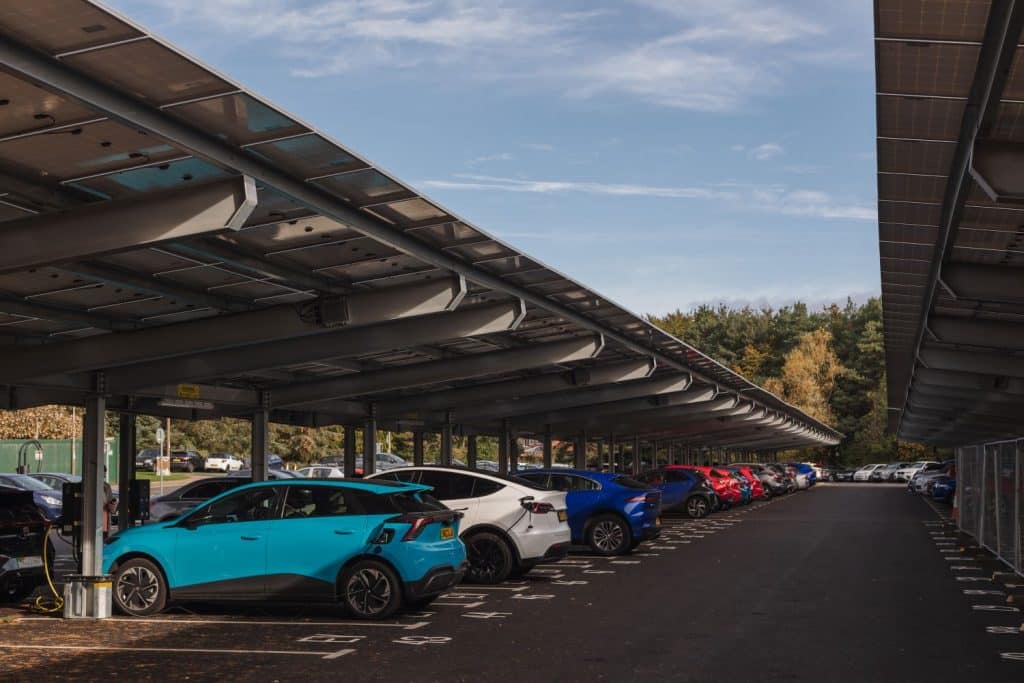| End User | Northumberland County Council |
|---|---|
| Industry | Public sector |
| Location | Northumberland, UK |
| Assets on site | Podium EMS / Wattstor BESS / EV Charging / DC coupled PV |
| Battery (BESS) | 440kW / 2,000 kWh |
| Time of delivery | 5 months |
Northumberland County Council offers diverse services in the North East, like recycling, housing, fire and rescue, road management, and more. The Council is undergoing significant transformation to reach net zero and improve the sustainability of its services. Main goal is electrification of its vehicle fleet and installation of solar carports at its Morpeth County Hall headquarters.
To help achieve that, the council requested to connect 1.6MW of EV chargers, powered by 800kWp of solar PV. However, due to grid constraints in the local area, it was unable to upgrade its 800kVA grid connection without meeting serious delays and additional costs.
The challenge: overcoming grid constraints to accelerate net zero
To overcome the grid constraints that were stalling the project, the council needed to install an integrated DC battery energy storage solution (BESS) at its Morpeth County Hall site.
Crucially, Wattstor’s DC coupling technology would allow the council to connect the full 800kW of solar PV required through utilising a 400kW battery inverter with a 2.36MWh battery. This solution allows the Council to harness and store as much solar energy as possible. Enough to satisfy its energy needs, while only connecting to the grid the permitted amount of 400kW.
Check out: How does DC coupling work?

To complete this project, the council was awarded funding from the European Regional Development Fund (ERDF) as part of the European Structural and Investment Funds Growth Programme 2014-2020. This was a very competitive UK-wide public tender. Out of dozens of applicants, the selection committee chose UK Power Network Services as the delivery partner and EPC. The commitee also selected Wattstor as the technology supplier.
Goals:
- Overcome grid constraints to allow 800kW of solar to be installed
- Support the rollout of an all-electric vehicle fleet through DC and AC chargers
- Implement effective peak shaving and load shifting to cut costs
Our approach: Energy 3.0 with solar, battery and Podium
Wattstor created a bespoke design and supplied the council with a DC-coupled battery – 400kW/2.36MWh BESS – with 800kW solar carports.

Source: Lynas Engineers
We also provided them with Podium, our sophisticated, AI-based EMS with predictive capabilities. Podium makes smart energy management decisions. These decisions are based on the current and future energy market trends, as well as the organisation’s energy needs and its predicted generation and storage capacity.
Its smart capabilities meant that Podium was one of the main reasons why Wattstor was chosen to deliver this project. Thanks to its AI-powered algorithms, Podium will allow the council to automatically shift load, implement peak shaving, avoid non-commodity costs, and manage load for its 1.6MW AC and DC EV chargers. In conclusion that will enable cost savings while making the most of solar energy.
Process:
- Bespoke design and supply of a DC-coupled 400kW/2.36MWh BESS – with 800kW solar carports
- Software integration with AC and DC charger supplied via Open Charge Point Protocol (OCPP), an application protocol enabling communication between EV charging stations and a central management system
- Implementation of Podium EMS
- Consultancy and support in coordinating the different phases of the project
Results: a successful EV fleet roll out
The implementation of solar PV, battery and a sophisticated EMS allowed the council to install ten 50kW DC chargers and 50 22kW AC chargers, with 800kWp of solar and a 400kW battery inverter to support the EV charging power required on site.
This means the council will be able to proceed with the roll out of its EV fleet. All without exceeding grid limits.
To learn more about the Wattstor’s approach to solar and battery systems, download our comprehensive guide to onsite renewable generation in 5 steps.
Up next...
Boosting sustainability and energy resilience for Exeter City Council
Contact us
If your commercial energy bills are too high but you have plenty of roof space, we could help you cut costs and carbon. Tell us more below
Contact us
If your commercial energy bills are too high but you have plenty of roof space, we could help you cut costs and carbon. Tell us more below
- +44 (0) 20 3868 5555
- [email protected]
- Wattstor Ltd, 21 Ironmonger Lane, London EC2V 8EY

